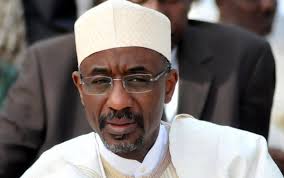If one deliberately refuses to even perform the stoning of the devil rituals, all he needs to do is just to slaughter a ram. So, if this is the situation, why do we go and suffer and die instead of sacrificing a ram.
Emir of Kano Muhammad Sanusi II stated this Friday when he led a delegation to visit Sokoto’s pilgrims in the on-going Hajj in Mekkah, Saudi Arabia.
“Sleeping in Mina and Muzdalifa is not backed by any Hadith or verse of the Qur’an,” he said.
His position was as a result of loss of lives,including Nigerians’, in the stampede that usually charatcerises stoning-of-the-devil ritual performed by the pilgrims in Muzdalifa after Arafat.
No fewer than two million partook in the rite in September.
He noted that no blacks, especially Nigerians, could have been held responsible for the fatal rush that killed 760 pilgrims, and injured about 1000 others.
Sanusi, who heads the 2015 Hajj delegation, said he would recommend to the federal government that if Nigerians wouldn’t get accommodation in Jamarat where Arabs stay in Mina, Nigerian pilgrims would no longer hang around Mina and Muzdalifa to pelt the Devil.
The emir’s statement carries some racial undertones, especially when he insisted Nigeria—among the nations calling for an investigation of the stampede— does not have any issue with the Saudi Arabian authorities.“…But they must understand that no human being is superior to another in the sight of God, except those who fear God most.”
Sanusi, an economist and University of Karthoum-trained Islamic scholar, has always appeared a liberal Muslim. His papers and speeches on Sharia since 1997, home and abroad, have emphasized that Islamic fundamentalism is more a socio-political issue than a religious one.
He has written a bunch of position papers on Islamic issues, including the Institutional Framework of Zakat: Dimension and Implications delivered in 2000;the Basic Needs and Redistributive Justice in Islam – The Panacea to Poverty in Nigeriadeliveredin 2001. A year later, he delivered The Hudhood Punishments in Northern Nigeria: A Muslim Criticism.
In July 2003 he presented The Shari’a Debate and the Construction of a ‘Muslim’ Identity in Northern Nigeria: A Critical Perspective at a seminar at the University of Bayreuth. In August 2003 he presented Democracy, Rights and Islam: Theory, Epistemology and the Quest for Synthesis.

 Business7 days ago
Business7 days ago
 Business6 days ago
Business6 days ago
 Education7 days ago
Education7 days ago
 Football15 hours ago
Football15 hours ago
 Crime7 days ago
Crime7 days ago
 Covid-196 days ago
Covid-196 days ago
 Business7 days ago
Business7 days ago
 Latest4 days ago
Latest4 days ago

